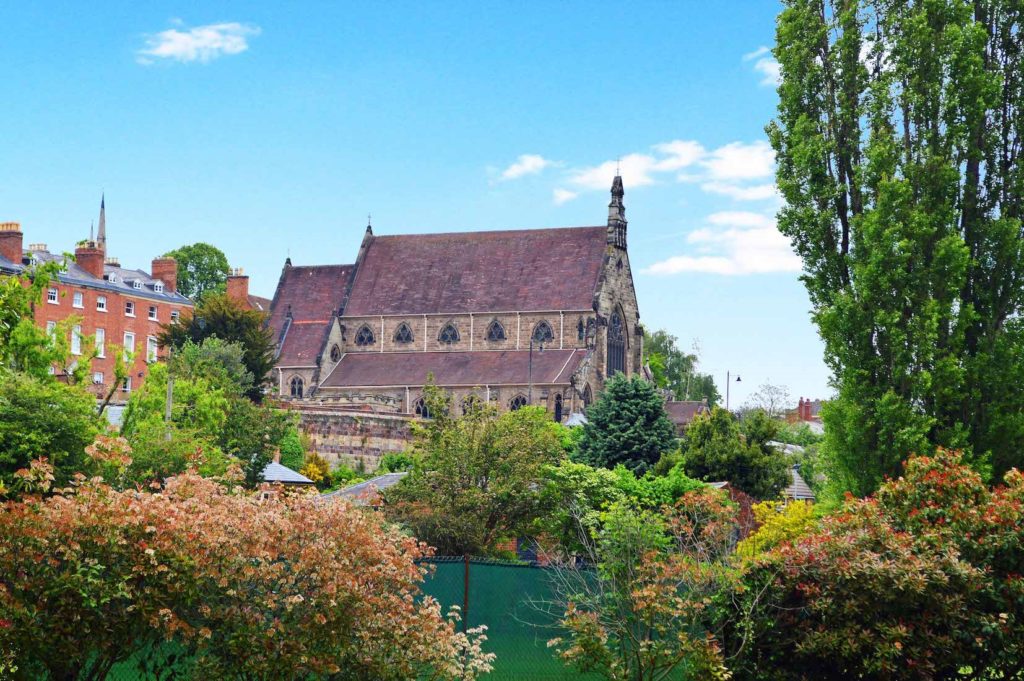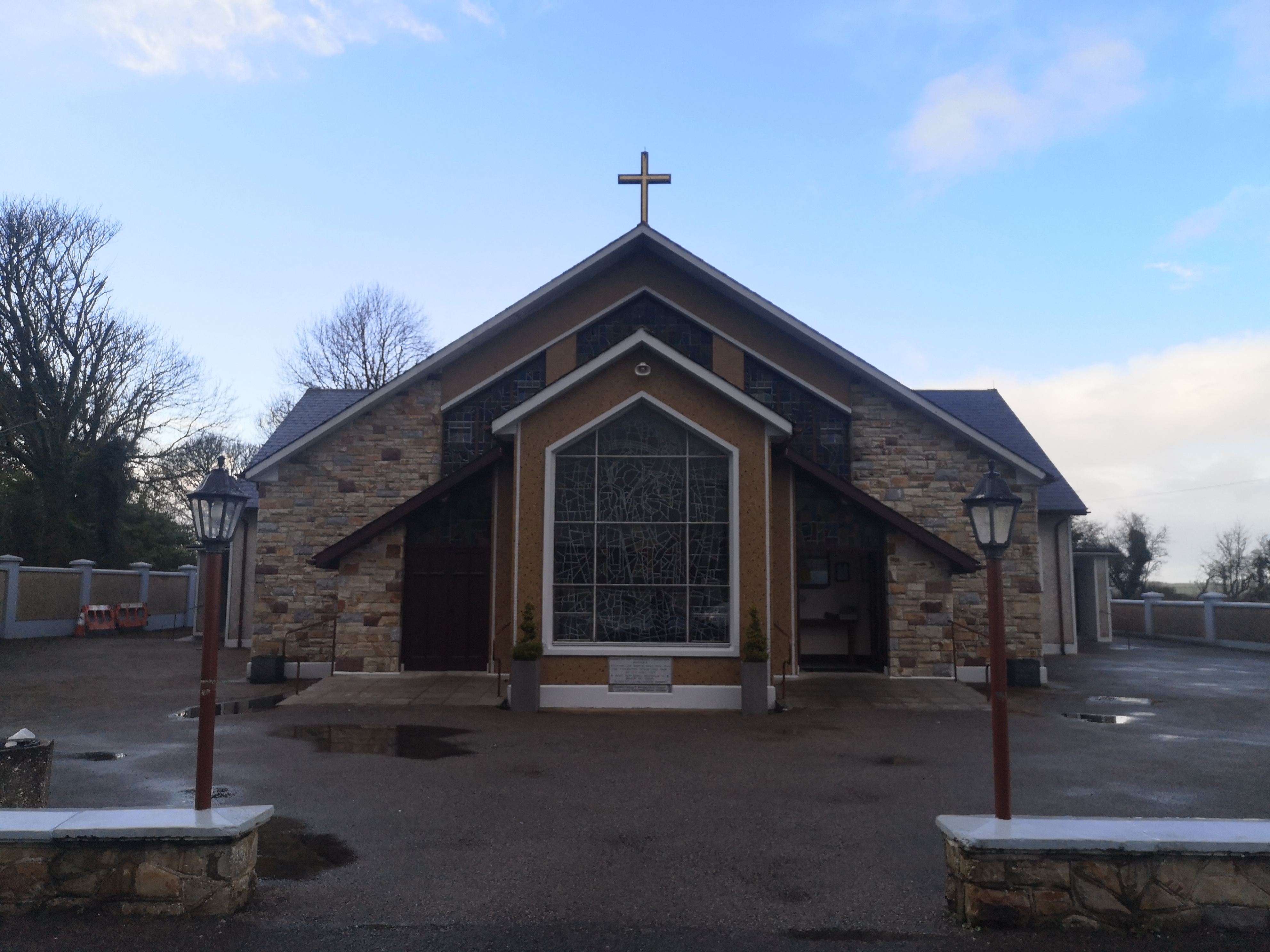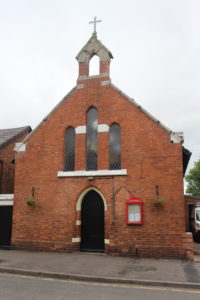Churches of the Day
Pictorial Thought for Today
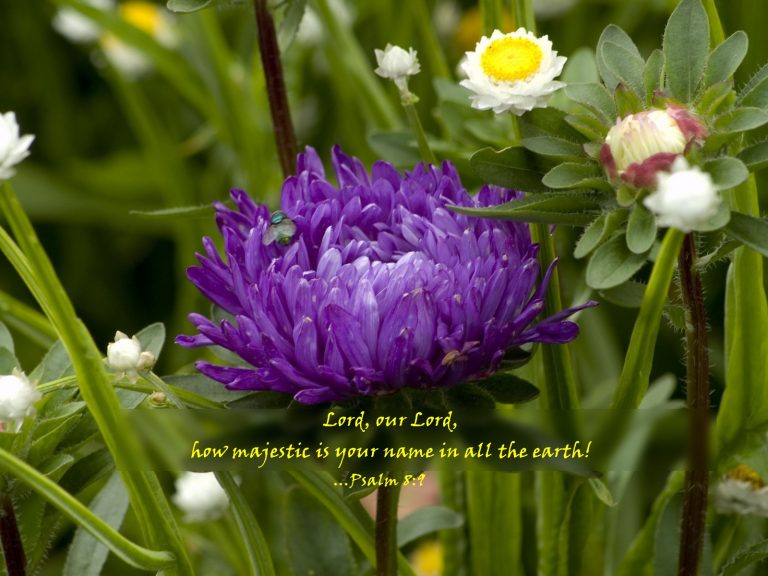
Apr 26 - Bl. Mary of the Incarnation (1566-1618)
Patrick Duffy tells some of what is known about her.
Married at Sixteen
 Marie Avrillot was born in Paris in 1566. Although at the age of sixteen she wished to become a nun, her parents insisted that she marry Pierre Acarie, vicomte de Villemore, by whom she had seven children. In spite of her household duties and many hardships, she attained the heights of mystical holiness.
Marie Avrillot was born in Paris in 1566. Although at the age of sixteen she wished to become a nun, her parents insisted that she marry Pierre Acarie, vicomte de Villemore, by whom she had seven children. In spite of her household duties and many hardships, she attained the heights of mystical holiness.Brought the Discalced Carmelite Nuns to Paris
Under the influence of the writings of St Teresa of Avila, and after mystical contact with the saint herself, Marie spared no effort in introducing the Discalced Carmelite nuns to Paris, France. This she was able to achieve in 1604 with the help of King Henry IV of France and his wife, Marie de Médici.
 Becomes a Lay Sister
Becomes a Lay SisterAfter her husband’s death, she asked to be admitted among them as a lay sister, taking the name of Mary of the Incarnation; she was professed at the Carmel of Amiens in 1615. She was highly esteemed by some of the greatest men of her time, including St Francis de Sales: and she was distinguished by her spirit of prayer and her zeal for the propagation of the Catholic faith. She died at Pontoise on April 18, 1618.
Friday, Fourth Week of Easter
FIRST READING
A reading from the Acts of the Apostles 13:26-33
God has fulfilled his promise by raising Jesus from the dead.
Paul stood up in the synagogue at Antioch in Pisidia, held up a hand for silence and began to speak:
'My brothers, sons of Abraham's race, and all you who fear God, this message of salvation is meant for you.
What the people of Jerusalem and their rulers did, though they did not realise it, was in fact to fulfil the prophecies read on every sabbath. Though they found nothing to justify his death, they condemned him and asked Pilate to have him executed.
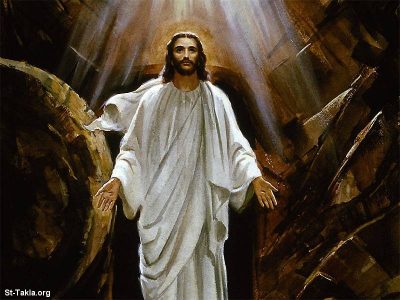
When they had carried out everything that scripture foretells about him they took him down from the tree and buried him in a tomb. But God raised him from the dead, and for many days he appeared to those who had accompanied him from Galilee to Jerusalem: and it is these same companions of his who are now his witnesses before our people.
'We have come here to tell you the Good News. It was to our ancestors that God made the promise but it is to us, their children, that he has fulfilled it, by raising Jesus from the dead. As scripture says in the first psalm: You are my son: today I have become your father.'
The Word of the Lord. Thanks be to God
Responsorial Psalm Ps 2
Response You are my Son. It is I who have begotten you this day.
Or Alleluia!
1. 'It is I who have set up my king on Zion, my holy mountain.'
I will announce the decree of the Lord: The Lord said to me: 'You are my Son.
It is I who have begotten you this day.' Response
2. 'Ask and I shall bequeath you the nations, Put the ends of the earth in your possession.
With a rod of iron you will break them, shatter them like a potter's jar.' Response
3. Now, O kings, understand, take warning rulers of the earth;
serve the Lord with awe and trembling, pay him your homage. Response
Gospel Acclamation Apoc 1:5
Alleluia, Alleluia!
I am the Way, the Truth and the Life, says the Lord; no one can come to the Father except through me.
Alleluia!
GOSPEL
The Lord be with you. And with your spirit
A reading from the holy Gospel according to John 14 1-6 Glory to you, O Lord
I am the Way, the Truth and the Life.
Jesus said to his disciples:
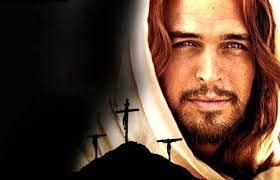 'Do not let your hearts be troubled. Trust in God still, and trust in me.
'Do not let your hearts be troubled. Trust in God still, and trust in me.There are many rooms in my Father's house; if there were not, I should have told you.
I am going now to prepare a place for you, and after I have gone and prepared you a place, I shall return to take you with me;
so that where I am you may be too.
You know the way to the place where I am going.'
Thomas said,
'Lord, we do not know where you are going, so how can we know the way?'
Jesus said:
'I am the Way, the Truth and the Life. No one can come to the Father except through me.'
The Gospel of the Lord. Praise to you, Lord Jesus Christ.
___________________________________
Gospel Reflection Friday Fourth Week of Easter John 14:1-6
Many of us find departures difficulty, especially when the person departing from us is significant for us in some way. The words Jesus speaks in today’s gospel reading are set by the evangelist within the context of the last supper on the evening before Jesus was crucified. Jesus is about to leave his disciples. Yet, in leaving them he also assures them that he is not abandoning them. He will in fact come back to them. That is the promise of Jesus to the disciples in today’s gospel reading, ‘I shall return to take you with me’. That promise is generally heard as a promise that at the end of our earthly lives Jesus will come and take us to the many roomed house of his Father, which is why this reading is so often chosen for the funeral liturgy.
However, Jesus goes on to assure his disciples that we don’t have to wait to the end of our lives to experience his coming. He will come to us in and through the Paraclete, the Holy Spirit, ‘whom the Father will send in my name’ and who ‘will teach you everything, and remind you of all that I have said to you’. Through the Spirit, the Lord comes to us here and now, today, and his coming through the Spirit is a foretaste, an anticipation, of his coming to us at the end of our lives. That is why Saint Paul refers to the Spirit as the first fruit of the final harvest, eternal life. Our present calling is to allow the first fruit of the Spirit to bear the rich fruit of love in our lives.
__________________________________
The Scripture Readings are taken from The Jerusalem Bible, published 1966 by Darton, Longman & Todd Ltd. and used with the permission of the publishers. http://dltbooks.com/
The Scripture Reflection is made available with our thanks from his book Reflections on the Weekday Readings 2021/ 2024: The Word is near to you, on your lips and in your heart by Martin Hogan and published by Messenger Publications 2022/23, c/f www.messenger.ie/bookshop/
_______________________________________________
Sliocht as Gníomhartha na nAspal 13:26-33
Thóg Dia Íosa ó mhairbh.
Nuair a tháinig Pól go dtí Antíoc na Pisidia dúirt sé sa tsionagog:
A bhráithre liom, a shliocht Abrahám agus a mhuintir in bhur measc a bhfuil ómós agaibh do Dhia, is chugainne a cuireadh an teachtaireacht shlánaitheach seo.Níor aithin muintir Iarúsailéim ná a gcuid uachtarán [Íosa], ach nuair a dhaor siad é, is amhlaidh a chuir siad i gcrích ráite úd na bhfáithe a bhíodh á léamh dóibh gach lá sabóide. Cé nach bhfuair siad aon chúis bháis ann d’iarr siad ar Phioláit é a chur den saol.
Agus nuair a bhí gach ní dá raibh scríofa ina thaobh comhlíonta acu thóg siad anuas den chrann é agus shín i dtuama é.
 thóg Dia ó mhairbh é agus ar feadh mórán laethanta chonacthas é dóibh sin a tháinig anuas leis ón nGailíl go Iarúsailéim agus is finnéithe anois iad air os comhair an phobail.
thóg Dia ó mhairbh é agus ar feadh mórán laethanta chonacthas é dóibh sin a tháinig anuas leis ón nGailíl go Iarúsailéim agus is finnéithe anois iad air os comhair an phobail.Agus seo é an dea-scéal atá le fógairt againne daoibh: an gealltanas úd a rinneadh dár sinsir, go bhfuil Dia tar éis é a chomhlíonadh dúinne, dá sliocht, trí Íosa a thógáil ó mhairbh, de réir mar atá scríofa sa dara salm:
‘Is tusa mo mhac. Inniu féin a ghin mé thú.’
Briathar an Tiarna Buíochas le Dia
Salm le Freagra Sm 2
Freagra Is tú mo mhac, inniu is ea a ghin mé thú.
Malairt freagra Alleluia!
1. “Chuir mise mo rí féin i réimeas ar Shíón, ar mo shliabh naofa.”
Foilseoidh mé reacht an Tiarna.
“Is tú mo mhac,” a dúirt an Tiarna liom, “inniu is ea a ghin mé thú. Freagra
2. Iarr orm agus tiomnóidh mé na ciníocha duit agus críocha na cruinne mar oidhreacht duit.
Déanfaidh tú iad a bhriseadh le slat iarainn; brisfidh tú ina mbloghanna iad amhail soitheach cré.” Freagra
3. Bígí críonna, dá bhrí sin, a ríthe; aire chugaibh! a rialtóirí na cruinne.
Déanaigí fónamh don Tiarna le heaglaagus tugaigí ómós dó go creathnach. Freagra
SOISCÉAL
Go raibh an Tiarna libh. Agus le do spiorad féin
Sliocht as an Soiscéal naofa de réir Naomh Eoin 14: 1-6 Glóir duit, a Thiarna.
Is mise an tslí, an fhírinne agus an bheatha.
San am sin dúirt Íosa lena dheisceabail:
'Ná bíodh buaireamh ar bhur gcroí: creideann sibh i nDia; creidigí ionamsa leis.

Is iomaí áras i dteach m’Athar. Mura mbeadh, d’inseoinn daoibh é.
Óir táim ag dul ag cur áite i gcóir daoibh,
agus má théim agus áit a chur i gcóir daoibh,
tiocfaidh mé arís agus tógfaidh mé sibh chugam féin;
i dtreo, an áit ina mbeidh mise, go mbeidh sibhse chomh maith.
Tá eolas na slí agaibh mar a bhfuilim ag dul.'
Dúirt Tomás leis:
“A Thiarna, ní eol dúinn cá bhfuil tú ag dul agus cén chaoi is féidir dúinn eolas na slí a bheith againn?”
Dúirt Íosa leis:
'Is mise an tslí, an fhírinne agus an bheatha. Ní thagann aon duine go dtí an tAthair ach tríomsa.'
Soiscéal an Tiarna. Moladh duit, a Chriost
AN BÍOBLA NAOFA
© An Sagart
The Fifth Sunday of Easter
The Church grows in the fear of the Lord, filled with the consolation of the Holy Spirit.
The Father watches over the growth of the vine that it may bear more fruit.
Faith, love and obedience to the commandments give life.
FIRST READING
A reading from the Book Acts of the Apostles 9:26-31
Barnabas explained how the Lord had appeared to Saul and spoken to him on his journey.
 When Saul got to Jerusalem he tried to join the disciples, but they were all afraid of him: they could not believe he was really a disciple. Barnabas, however, took charge of him, introduced him to the apostles, and explained how the Lord had appeared to Saul and spoken to him on his journey, and how he had preached boldly at Damascus in the name of Jesus.
When Saul got to Jerusalem he tried to join the disciples, but they were all afraid of him: they could not believe he was really a disciple. Barnabas, however, took charge of him, introduced him to the apostles, and explained how the Lord had appeared to Saul and spoken to him on his journey, and how he had preached boldly at Damascus in the name of Jesus.Saul now started to go round with them in Jerusalem, preaching fearlessly in the name of the Lord. But after he had spoken to the Hellenists, and argued with them, they became determined to kill him. When the brothers knew, they took him to Caesarea, and sent him off from there to Tarsus.
The churches throughout Judaea, Galilee and Samaria were now left in peace, building themselves up, living in the fear of the Lord, and filled with the consolation of the Holy Spirit.
The Word of the Lord Thanks be to God
Responsorial Psalm Ps 21
Response You, Lord, are my praise in the great assembly.
Or Alleluia!
1. My vows I will pay before those who fear him. The poor shall eat and shall have their fill.
They shall praise the Lord, those who seek him. May their hearts live for ever and ever! Response
2. All the earth shall remember and return to the Lord, all families of the nations worship before him.
They shall worship him, all the mighty of the earth; before him shall bow all who go down to the dust. Response
3. And my soul shall live for him, my children serve him. They shall tell of the Lord to generations yet to come,
declare his faithfulness to peoples yet unborn: 'These things the Lord has done.' Response
SECOND READING
A reading from the first letter of St John 3:18-24
His commandments are these:
that we believe in the name of his Son Jesus Christ and that we love one another.
My children,
our love is not to be just words or mere talk, but something real and active;
only by this can we be certain that we are the children of the truth
and be able to quieten our conscience in his presence,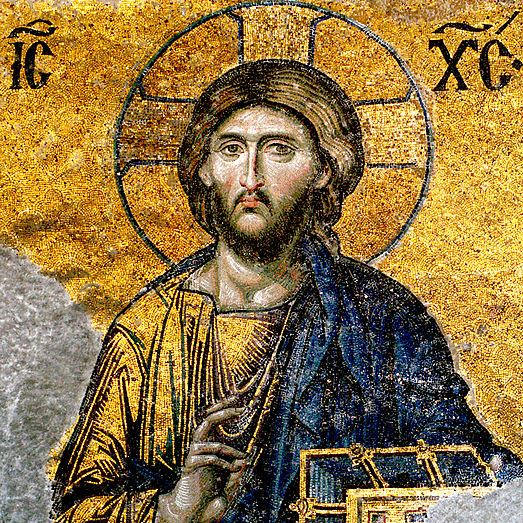
whatever accusations it may raise against us, because God is greater than our conscience and he knows everything.
My dear people, if we cannot be condemned by our own conscience,
we need not be afraid in God's presence, and whatever we ask him, we shall receive, because we keep his commandments and live the kind of life that he wants.
His commandments are these:
that we believe in the name of his Son Jesus Christ
and that we love one another as he told us to.
Whoever keeps his commandments lives in God and God lives in him.
We know that he lives in us by the Spirit that he has given us.
The Word of the Lord Thanks be to God
Gospel Acclamation Jn 14: 10
Alleluia, alleluia!
Make your home in me, as I make mine in you. Whoever remains in me bears fruit in plenty.
Alleluia!
GOSPEL
The Lord be with you And with your spirit
A reading from the holy Gospel according to John 15:10 Glory to you, O Lord
Whoever remains in me, with me in him, bears fruit in plenty.
Jesus said to his disciples:
'I am the true vine, and my Father is the vinedresser.
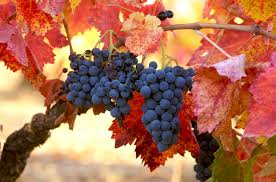
Every branch in me that bears no fruit he cuts away,
and every branch that does bear fruit he prunes to make it bear even more.
You are pruned already, by means of the word that I have spoken to you.
Make your home in me, as I make mine in you.
As a branch cannot bear fruit all by itself, but must remain part of the vine, neither can you unless you remain in me.
 I am the vine, you are the branches.
I am the vine, you are the branches.Whoever remains in me, with me in him, bears fruit in plenty;
for cut off from me you can do nothing.
Anyone who does not remain in me is like a branch that has been thrown away - he withers; these branches are collected and thrown on the fire, and they are burnt.
If you remain in me and my words remain in you, you may ask what you will and you shall get it. It is to the glory of my Father that you should bear much fruit, and then you will be my disciples.'
The Gospel of the Lord. Praise to you, Lord Jesus Christ
For homily resources for this Sunday's Gospel click here: https://www.catholicireland.net/sunday-homily/
Taken from THE JERUSALEM BIBLE, published and copyright 1966 by Darton, Longman and Todd Ltd and Doubleday, a division of Random House Inc, and used by permission of the publishers.
Sliocht as Leabhar Gníomhartha na nAspal 6:26-31
D'inis Barnabas do na haspail mar a chonaic Sól an Tiarna ar an tslí.
 Ar theacht dó go Iarúsailéim rinne sé iarracht ar dhul i bpáirt leis na deisceabail ach bhí eagla orthu go léir roimhe mar ní chreidfidís gur dheisceabal é. Ansin thóg Barnabas faoina chúram é agus thug i láthair na n-aspal é, ag aithris dóibh conas mar a chonaic sé an Tiarna ar an mbóthar agus mar a rinne sé comhrá leis agus mar a labhair sé go teann in ainm Íosa i nDamaisc.
Ar theacht dó go Iarúsailéim rinne sé iarracht ar dhul i bpáirt leis na deisceabail ach bhí eagla orthu go léir roimhe mar ní chreidfidís gur dheisceabal é. Ansin thóg Barnabas faoina chúram é agus thug i láthair na n-aspal é, ag aithris dóibh conas mar a chonaic sé an Tiarna ar an mbóthar agus mar a rinne sé comhrá leis agus mar a labhair sé go teann in ainm Íosa i nDamaisc. D’fhan Sól in éineacht leo in Iarúsailéim gan chosc gan cheangal air ach é ag labhairt go dána in ainm an Tiarna. Bhíodh sé ag caint agus ag conspóid leis na Giúdaigh Heilléanacha freisin. Rinne siadsan iarracht ar é a mharú ach nuair a fuair na bráithre amach é, thóg siad Sól leo go Céasaráia agus chuir as sin go Tarsas é. Mar sin bhí síocháin ag an Eaglais ar fud Iúdáia go léir agus na Gailíle agus na Samáire. Lean sí á tógáil féin agus ag dul chun cinn faoi eagla an Tiarna agus ag dul i méid le cabhair an Spioraid Naoimh.
Briathar an Tiarna Buíochas le Dia
Salm le Freagra Sm 21
Freagra Is tú mo mholadh sa mhórthionól, a Thiarna.
Malairt Freagra Alleluia!
I. Comhlíonfaidh mé mo mhóideanna i láthair na droinge ar a mbíonn a eagla.
Íosfaidh na bochtáin agus beidh a sáith acu. Molfaidh lucht a iarrtha an Tiarna.
Go maire a gcroíthe go brách na breithe. Freagra
2. Cuimhneoidh an domhan uile agus casfaidh ar an Tiarna, agus adhrfaidh na ciníocha uile ina fhianaise.
Adhrfaidh maithe móra an talaimh ina fhianaise. Cromfaidh ina láthair a ngabhann síos sa luaithreach. Freagra
3. Mairfidh m'anam ar a shon; déanfaidh mo chlann fónamh dó. Tabharfaidh tuairisc an Tiarna do ghlúin atá le teacht.
Foilseoidh siad a dhílseacht do phobal nár saolaíodh fós: 'Sin iad na nithe a rinne an Tiarna.' Freagra
DARA LÉACHT
Sliocht as an chéad Litir Naomh Eoin 3:18-24
Seo í an aithne a thug sé: go gcreidfimis in ainm a Mhic Íosa Críost agus go dtabharfaimis grá dá chéile.
 A chlann liom, ná tugaimis grá briathair ná cainte amháin, ach grá gnímh agus fírinne. Is mar sin a aithneoimid gur de chlann na fírinne sinn, agus is mar sin a shuaimhneoimid ár gcoinsias ina láthairsean, má chiontaíonn ár gcroí sinn. Óir gur treise é Dia ná ár gcroí-ne agus is feasach dó an uile ní.
A chlann liom, ná tugaimis grá briathair ná cainte amháin, ach grá gnímh agus fírinne. Is mar sin a aithneoimid gur de chlann na fírinne sinn, agus is mar sin a shuaimhneoimid ár gcoinsias ina láthairsean, má chiontaíonn ár gcroí sinn. Óir gur treise é Dia ná ár gcroí-ne agus is feasach dó an uile ní.A chairde cléibh, mura gciontaíonn ár gcroí sinn táimid lánmhuiníneach as Dia. Agus cibé ní a agraímid air, gheobhaimid uaidh é, ó tharla go gcoinnímid a aitheanta agus go ndéanaimid beart de réir a thaitnimh. Agus seo í an aithne a thug sé: go gcreidfimis in ainm a Mhic Íosa Críost agus go dtabharfaimis grá dá chéile, de réir mar a d’ordaigh seisean dúinn. An té a choinníonn a aitheanta, maireann i nDia, agus maireann seisean ann. Agus is mar seo a aithnímid go maireann sé ionainn, tríd an Spiorad a thug sé dúinn.
Briathar an Tiarna Buíochas le Dia
Alleluia Véarsa Eo 15: 4-5
Alleluia, Alleluia!
'Fanaigí ionamsa, agus mise ionaibh,' a deir an Tiarna.
'An té a fhanann ionamsa, tugann sé toradh mór uaidh.'
Alleluia!
SOISCÉAL
Go raibh an Tiarna libh. Agus le do spiorad féin
Sliocht as an Soiscéal naofa de réir Naomh Eoin 15:1-8 Glóir duit, a Thiarna.
An té a fhanann ionamsa, agu mise ann, tugann sé toradh mór uaidh
San am sin dúirt Íosa lena dheisceabail:
Mise an fhíniúin fhíor, agus is é m’Athair an saothraí.
Gach géag ionam nach dtugann toradh, bainfidh sé í;
agus gach géag a thugann toradh, ionas go dtabharfaidh sí breis toraidh.
Tá sibhse bearrtha de bharr an bhriathair a labhair mé libh.
Fanaigí ionamsa, agus mise ionaibh. Faoi mar nach féidir don ghéag
toradh a thabhairt uaithi féin, mura bhfanann sí san fhíniúin,sin mar nach féidir daoibhse, mura bhfanann sibh ionamsa.

Mise an fhíniúin, sibhse na géaga; an té a fhanann ionamsa, agus mise ann,
tugann seisean toradh mór uaidh; óir gan mise, ní féidir daoibh aon ní a dhéanamh.
Cibé nach bhfanfaidh ionamsa, caithfear amach é mar ghéag, agus feofaidh sé;
agus tógfar agus caithfear sa tine iad, agus dófar iad.
Má fhanann sibh ionamsa agus má fhanann mo bhriathra ionaibh,
iarrfaidh sibh cibé ní is mian libh agus déanfar daoibh é.
Tugadh glóir do m’Athair sa mhéid go dtugann sibhse toradh mór uaibh,
agus go mbeidh sibh in bhur ndeisceabail agamsa.
Soiscéal an Tiarna. Moladh duit, a Chriost
************************************
Machtnamh ar Bhriathar Dé dia 5ú Domhnach na Cásca
Cén fáth go bhfuil gá le bearradh
Tá fhios ag na daoine a chothaionn rósanna go gcaithfear na plandaí a bearradh gach blian más mian leo fás maith a bheith iontu. Is fíor sin don chuid is mó de plandaí mar an chéanna; cabhraíonn an bhearradh leis an shaol nua. Tagraíonn Íosa le bearradh sa soiscéal inniú. Tugann sé le fios go ndéanann Dia bearradh ar ár saol ó am go h’am, chun iad a dhéanamh níos fiúnta ná mar atá siad faoi láthair. Tá roinnt rudaí ann a gur chóir a dhíbirt, má’s mian linn bheith cóir i láthair Dé. Thárlódh sé go mba thairfí an rud é scaoileadh le rudaí áirithe , cé gur leasg linn ag an am, a cabhródh linn cur len ár gcaidreamh le Dia agus le daoine eile. Nuair a déantar an bearradh seo is giorra dúinn bíonn an Tiarna, i bhfocail an tsoiscéil, déanann sé cónái linn. Ní gá dúinn a bheith ag brath ar ár neart féin. Nuair a bhíonn an Tiarna ag cur faoi ionainn bíonn Sé taobh linn, rud a thugann saol nua níos torthúla dúinn. Ach chun go dtarlódh seo ní mór dúinn fanacht in a láthair mar a fhanann sé linne.
Pádraig Ó Rúairí, cp,
Sliabh Argus, Átha Cliath.
********************************************
AN BÍOBLA NAOFA
© An Sagart


